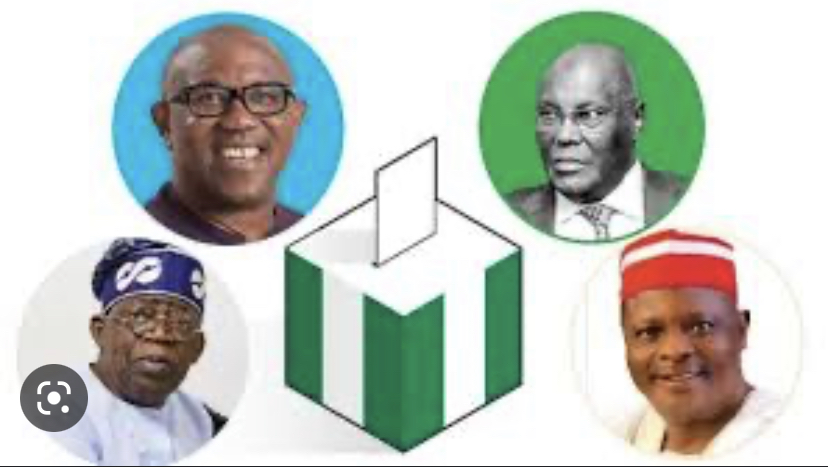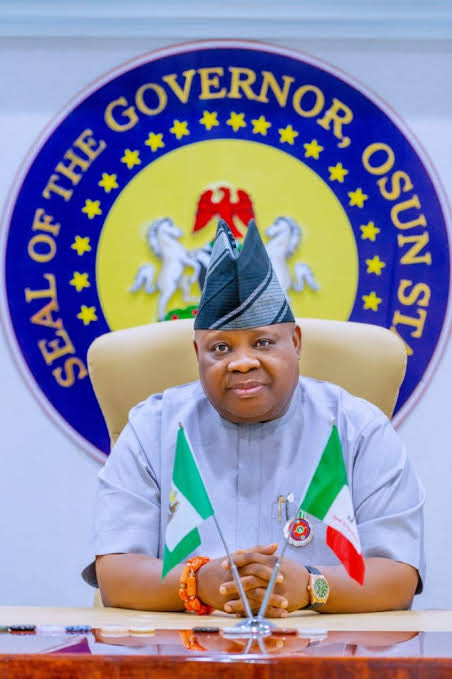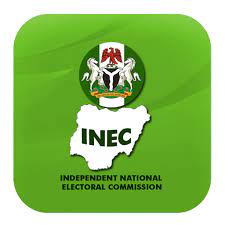POLITICS
2023 Elections: INEC Must be Firm – Durkwa

From Jude Dangwam, Jos
The Executive Director, of the International Organisation for Peace Building and Social Justice Mr. Ishaya Durkwa has called on the Independent National Electoral Commission (INEC) to ensure that whoever wins legitimately in the ongoing general elections in Nigeria should be announced.
He appealed to whosoever that might not feel satisfied with the outcome of the elections should seek redress through the Court to avoid the loss of innocent lives and properties in the country.
Durkwa stated this yesterday in an interview with newsmen in Jos the Plateau State capital.
In his words, “I am calling on INEC to ensure that whoever wins should be declared and you must not take side.
You’re the umpire, the world is seeing you, the world is gathered here. Nigeria is not just any kind of nation that could be looked at with despite.“So, the whole world is standing still watching us, I call on you to stand your ground and ensure the right thing is done so that Nigerians can get justice.”
Durkwa called on political players and other stakeholders in the country to talked to their followers and ensure that the peaceful atmosphere is sustained even after the elections across the country. “I called on stakeholders to rise up because is not enough to bring people to signed peace accord. But it is equally important to see that peace is seen.”
He reiterated that the work of the National Peace Committee is not done yet but should collaborate with INEC and well meaning Nigerians to ensure that no one is disenfranchised.
The Executive Director suggested thus, “There are different avenues we can seek redressed, what we don’t want is people going to the street, what we don’t want is people going into riot, we don’t want burning and looting. We want peace in our society, we want peace in our communities and in our nation.
“Because, 27,000 people died in the last 20 years as a result of different kind of crisis. Already some people have died in the course of this elections and some are wounded,” he expressed concerned.
POLITICS
Anambra: INEC Registers 96,085 New Voters, Extends CVR by Three Days

The Independent National Electoral Commission (INEC) said it has registered 96,085 new voters in nine days and extended the exercise by three days in Anambra.
The commission disclosed this in a statement by Sam Olumekun, National Commissioner and Chairman, Information and Voter Education Committee, on Thursday in Abuja, after its weekly meeting.
He said that on the preliminary stage of the CVR, 56,017 representing 58 per cent of new registrants were female while 50,429 52 representing 48 per cent were young people between the ages of 18 and 34.
“The commission is pleased with the turnout of registrants in Anambra and the peaceful conduct of the Continuous Voters Registration (CVR) in all the 326 registration centres in the state.
“As of yesterday, Wednesday, 96,085 new voters have successfully registered in nine days. On average, the Commission registered over 10,600 voters per day.
“In addition, 12,595 voters applied for transfer of their registration both within and outside the state while 7,061 persons applied for the update of their records or the replacement of their damaged or lost Permanent Voters Cards (PVCs).
“The CVR in Anambra ends today. However, in response to appeal from citizens, the Commission hereby extends the exercise for three more days. It will now end on Sunday, July 20,” he said.
Olumekun said that the commission would thereafter display the register for claims and objections by citizens as provided by law.
This, according to him, will be followed by a further clean-up of the data using the Automated Biometric Identification System (ABIS).
“Subsequently, the detailed breakdown of the new registrants by age, gender, occupation and disability will be published for public information,” he said.
Olumekun also disclosed that INEC had received five more letters of intent from associations seeking registration as political parties.
According to him, the new application brings the number received so far by the commission to 134.
Olumekun stated that the details of the new associations, indicating their proposed names, acronyms, logos, addresses and interim leaderships were already published on INEC website and other platforms for public information.
He said that INEC would continue to keep the citizens up to date on all its activities.
POLITICS
PDP Stakeholders Olorunda Pass Vote of Confidence on Gov Adeleke

From Ayinde Akintade, Osogbo
The Olorunda Peoples’ Democratic Party, PDP, Stakeholders has passed vote of confidence on Governor Ademola Adeleke of Osun State, re-affirm loyalty, and pledge to support his future political alignment.
Following a critical meeting of the Olorunda Local Government Stakeholders of the Peoples Democratic Party (PDP), held at the residence of the Apex Leader, Senator Dr.
Oluwole Alabi, stakeholders across the political spectrum unanimously passed a vote of confidence on the Executive Governor of the State, His Excellency, Senator Ademola Jackson Nurudeen Adeleke.The meeting, chaired by Senator Dr. Oluwole Alabi and moderated by Aare Ganiyu Ayobami Olaoluwa Asejere, brought together key political functionaries, state appointees, and party executives at state, local, and ward levels from Olorunda Local Government area of the state.
In the communiqué made available to our Correspondent in Osogbo the Osun State capital shortly after the meeting, the stakeholders collectively expressed their unwavering loyalty and unflinching support to Governor Adeleke and committed themselves to following his political direction in the interest of continued progress and good governance in Osun State.
The communiqué reads in part
“We, the undersigned leaders and stakeholders of the PDP in Olorunda Local Government area, having extensively deliberated on the current political climate, hereby pass a unanimous vote of confidence in the sterling leadership of His Excellency, Senator Ademola Jackson Nurudeen Adeleke
“We commend his people-oriented governance style, visionary leadership, and impactful delivery of the Imole developmental agenda, which stands as the most transformative in the history of Osun State.
“As loyal party stakeholders, we reaffirm our total and unshaken loyalty to Governor Adeleke, who has continuously demonstrated commitment to inclusive development, good governance, and service to humanity.
“We further resolve to follow His Excellency’s political direction and align with his future political choices irrespective of platform, believing in his judgment as the authentic custodian of the Imole mandate and the symbol of progress in our dear state.
“We stand united behind Governor Adeleke’s leadership and remain resolute in our commitment to actualizing his vision for Osun State, now and beyond 2030.”
“This communiqué reflects the collective will of the leadership and stakeholders of Olorunda PDP and symbolises their unwavering readiness to continue working under the guidance of Governor Adeleke for the continued upliftment of Osun State”.
The meeting has in attendance, Senator Dr. Oluwole Alabi, Aare Ganiyu Ayobami Olaoluwa Asejere, Rep. Maruff Adewale Gangaria, Dr. Muyiwa Oladimeji, Elder Funsho Isola, Hon. Olaide Ajibola, High Chief Apesin Olanrewaju Akolade, Hon. Obafemi Akolade, Hon. Ademola Nurudeen Hamzat, Hon. Nathaniel Ojetola, and Hon. Kunle Olaniyan while the communique was duly signed by all of them.
POLITICS
2027: Why Governor Sule Must Not Exit the State Yet

By Abel Zwanke, Lafia
As 2027 approaches and the end of Governor Abdullahi Sule’s second term draws nearer, political voices across Nasarawa State are growing louder not in the usual clamor for succession, but in a rare, unified call for continuity. From political stakeholders and traditional rulers to civil society actors and the youth, a consensus is emerging: Governor Sule must not exit the political stage just yet.
Though his constitutional term as governor winds down, many believe his experience, credibility, and technocratic leadership are needed beyond 2027—either in the Senate or in a stabilizing role within the All Progressives Congress (APC).
From Akwanga to Nassarawa Eggon and Wamba which are his immediate constituency, voices are rising—not just within the ruling All Progressives Congress (APC), but also from non-partisan stakeholders and everyday citizens—urging Governor Sule to remain actively involved in shaping Nasarawa’s political and developmental future beyond 2027, even if not from the seat of power in Government House.
A Legacy in Progress
Governor Abdullahi Sule, a technocrat with roots in the private sector, has been lauded for running a government built on planning, transparency, and purposeful development. His second term in office has seen vast investments in infrastructure, agriculture, health, education, and industrialisation.
David Sylvester, a political analyst based in Lafia, noted:
“What Sule has done is lay a template that is difficult to reverse. The people are seeing real governance—not just speeches. That’s why the public wants him to remain, perhaps in the Senate or as a stabilizing figure within the party.”
The recent endorsement of Governor Sule by stakeholders from Nasarawa North Senatorial District further validates this momentum. At a political gathering in Akwanga, party elders and youth leaders alike resolved to back him for a senatorial bid.
Dr. Kassim Muhammed Kassim Executive Chairman of the Nasarawa State Universal Basic Education Board (NSUBEB), one of the strongest voices in this call remarked that:
“This is not just about politics. We are talking about someone who has brought credibility to governance. Nasarawa cannot afford to lose that influence, whether in the Senate or as a guiding force.”
Dr. Kassim, also described Governor Sule as “a stabilizer in Nasarawa’s democratic journey.”
“Governor Sule is not only a performer; he is a symbol of political maturity, calmness, and inclusive governance,” Kassim stated during a stakeholders’ meeting in Akwanga.
“We need him in the Senate or any strategic position to ensure the continuity of this leadership philosophy that has brought peace and progress to our state.”
Kassim’s sentiments echo what many in the North Central state now describe as a “popular mandate” for Sule to continue representing the people, not necessarily from the Government House, but from Abuja, where his voice and connections could do even more for Nasarawa.
Influence, Preserving Vision
Stakeholders view the Senate as the most logical next step for the governor. With his strong background in engineering, finance, and public policy, analysts also believes he could play a vital role in national policymaking, especially around mining regulation, agricultural development, and intergovernmental cooperation.
Maryam Abdullahi, a civil society coordinator in Keana, explained:
“We’ve seen what he did with the Dangote sugar refinery, lithium investments, and agribusiness zones. With access to the Senate, Nasarawa stands to benefit even more.”
Observers also point to Sule’s rising influence within the Tinubu-led APC government as another reason to retain his relevance beyond 2027.
“Sule is seen as a strategic player in North-Central politics—his calm, development-first approach gives him credibility not just within Nasarawa, but also in Abuja.”
Balancing Zoning, Stability, and Merit
Of course, politics in Nasarawa cannot be divorced from the longstanding tradition of power rotation. Already, conversations around zoning the governorship seat to the Western zone have gained traction.
But stakeholders caution that zoning should not come at the cost of performance.
Dr. Madaki Williams, a lecturer and political commentator, noted: “Zoning has its place, but it must not override competence. Sule’s style of leadership is issue-based, result-driven. That kind of governance shouldn’t be zoned out.”
Many say Governor Sule is uniquely positioned to balance these concerns—by playing a mentoring role in succession planning, ensuring a candidate with both competence and acceptability emerges.
A local youth leader in Karu, Ibrahim Baba, stated:
“We don’t want a return to the old ways—where politics was about godfatherism and patronage. Governor Sule should help us choose a worthy successor and also represent us at the federal level.”
Civil Society and Youth Join the Chorus
The calls for continued leadership aren’t just political. Civil society groups, especially youth and women’s organisations, say Governor Sule’s administration has given them more inclusion, access, and attention than previous governments.
Programs like the Nasarawa Health Insurance Scheme (NASHIS), mass teacher recruitment, educational infrastructure development, and the revitalization of primary healthcare centres have directly impacted citizens.
Juliet Yakubu, a volunteer with a grassroots health NGO, shared:
“Before now, people died in silence. But under Governor Sule, health centres are functional, and rural areas now have better access to doctors. We need this kind of leadership to continue—even if not in the same office.”
Youth groups also praised the governor’s investments in skill acquisition, small enterprise grants, and digital initiatives, urging that such policies must not be discarded after his tenure ends.
Risks of a Power Vacuum
Some political observers warn that Nasarawa could face a regression if the transition from Sule’s administration is not well managed. With multiple interests jostling for control, both within and outside the APC, a power vacuum could reverse much of the developmental progress.
“Without a steady hand to manage the transition, we may end up with infighting, weak governance, and even a divided house in 2027,” warned Yusuf Danlami, a political journalist.
That’s why many see the governor’s continued presence, whether in the Senate, as a mentor, or national policy figure as vital to preserving unity and focus.
Beyond the Office, A Symbol of Governance Reform
Even those who believe Sule should step aside from direct elective office concede that his influence must remain part of the Nasarawa equation.
As Daily Asset editorialized in a recent opinion:
“Governor Sule has redefined what it means to lead in Nasarawa. His legacy goes beyond roads and buildings; it’s about systems that work. That kind of leadership cannot be left to chance.”
The editorial continued, noting that Nasarawa needs “a visionary elder statesman who can watch the house and guard the blueprint.”
The People Have Spoken
Whether it is in the calm voice of an elder in Akwanga, the hopeful chants of youth in Nassarawa Eggon and Wamba or the precise arguments of analysts in one message stands out: Governor Sule’s job is not yet done.
From fiscal transparency to rural development, stakeholder consensus is growing that Nasarawa must not drift into uncertainty. As the 2027 political cycle begins, the state faces a choice—either to allow reforms to take root or risk losing the governance gains achieved.
And for many citizens, the solution lies in not just who takes over but who remains to guide, mentor, and safeguard the future.
“He doesn’t need to run for governor again,” said Hauwa Ahmed, a trader in Lafia. “But let him go to the Senate. Let him still be there for Nasarawa.”
Nasarawa still needs Sule beyond 2027.
| ReplyReply allForwardAdd reaction |























